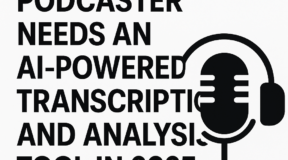One of the most compelling reasons to adopt AI transcription is the dramatic speed advantage over manual transcription. Traditional human transcribers typically take 24–72 hours to deliver a transcript, whereas AI‑assisted systems can complete the same task in 6–36 hours or less. Real‑time speech recognition engines can process audio in minutes, and features like smart segmentation, speaker diarisation and instant draft generation further accelerate the workflow. AI transcripts often include confidence scores that highlight segments needing human review, making editing faster and more targeted. By blending AI with human oversight, some services e cut average turnaround times by 46 % while maintaining over 98 % accuracy.
# Faster and more scalable
Beyond speed, AI transcription scales effortlessly. Modern speech‑to‑text algorithms can handle large volumes of content and multiple languages at once. Manual transcription teams, by contrast, are limited by the number of available transcribers and the time each person can dedicate. AI systems also produce consistent formatting and can automatically insert timestamps and metadata. Compared to manual services—where cost rises with labour hours—AI transcription is more cost‑efficient because it reduces the hours required for typing and editing.
How Dicta AI improves productivity
Dicta AI is designed to maximise speed and efficiency. Once a file is uploaded, the platform’s AI engine generates a transcript in as little as 5–10 minutes. Users can enable premium features such as summarisation and auto‑generated chapters to quickly identify key points and structure long recordings. The option to remove filler words or profanity helps produce clean, professional transcripts without extra editing. Dicta AI also supports multiple file formats and uses an intuitive dashboard to track progress. These capabilities streamline the transcription process from start to finish, delivering accurate text quickly and freeing users to focus on higher‑value work.
In short, AI transcription delivers results faster and more efficiently than manual methods. Services like DiDicta AIeverage real‑time speech recognition, smart segmentation and customisation features to reduce turnaround time and simplify editing. For organisations that handle large volumes of audio or require quick turnaround, AI transcription is a powerful productivity tool.





